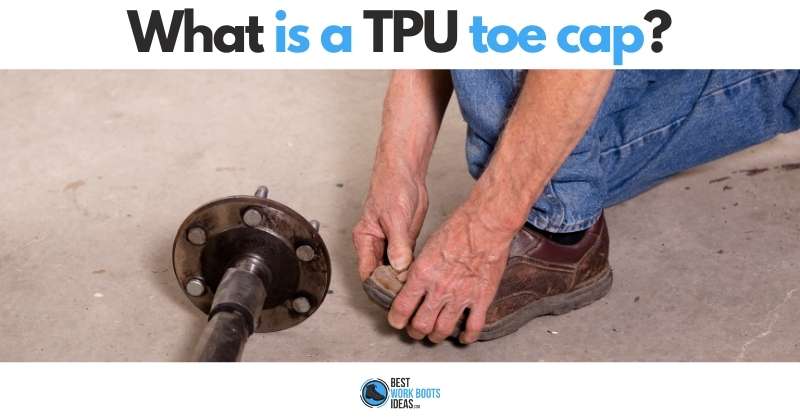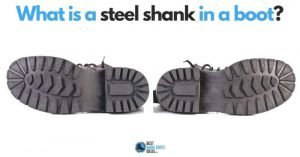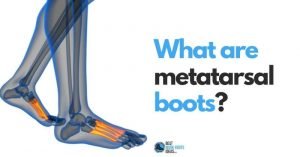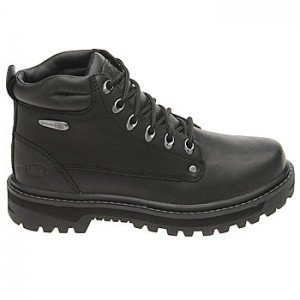What is a TPU Toe Cap? Everything You Need to Know About This Next Generation Foot Protection Technology

The talk of the town is all about toe caps, and one type that’s gotten more attention in recent years are TPU caps.
Today I’m going to get into what TPU is, what it’s good for, and maybe help you discover if TPU caps are something that could help you on the job.
Contents
What Does TPU Stand For?
TPU is an acronym for Thermoplastic Polyurethane.
Great, Now What is a TPU Toe Cap?
TPU is what work boots toe caps are made of, what gives them their flexibility and what makes them water resistant.
TPU is a family of plastics with a high level of adaptability for different uses.
TPU has been referred to as the middle-ground between rubber and plastic.
It’s built of variations of block copolymers with alternating hard and soft segments.
In layman’s terms: TPU is the name for a plastic family that’s extremely malleable.
The molecular structure of the TPU plastics are built of alternating hard and soft portions that can be edited in ratio without losing their structural integrity.
That’s how outsoles, midsoles, insoles, and composite toe caps can all be made out of TPU even though they perform quite differently.
The wire casing on most cables? TPU.
Chemical solvents and adhesives? TPU.
The handles and trays in your dentist’s office? TPU.
I was tempted to call my parents-in-law (both chemists), or my best friend (a physicist), to help me explain this to you.
I stopped when I realized I still wouldn’t really understand it on the level necessary to be an expert, and I’d lose you in the process.
What Are The Benefits of TPU Toe Caps?
- Lighter than steel and alloy toe caps.
- Provide better ventilation and heat reduction than steel toe caps.
- Not conducive to heat or cold.
- Not conducive to electricity.
- Won’t set off a metal detector.
Are All Composite Toe Caps Made of TPU?
No. Composite toe caps are not all made of TPU, however, they are currently one of the most popular styles.
It’s a safe bet that if the material of a composite toe cap isn’t specified in the product description, it’s likely to be a TPU toe cap.
This is my suggestion, so don’t quote me on it, but I’ll give you my reasoning behind it all.
The other options for composite toe caps are: fiberglass, kevlar, carbon fiber.
All are more expensive to manufacture, and all have a greater “cool-factor.”
You will notice when looking at different composite toe work boots, some simply say “composite toe.”
Other products will detail the nano-tech carbon fiber etc…that makes their product special. It’s extra strong, it’s extra light weight, it can literally stop a bullet; you get the point.
Even the most respectable work boot brands won’t miss an opportunity to justify a higher price.
I’m not saying that’s a bad thing, it’s understandable, reasonable, and I’d do the same thing.
It’s just that they’re not offering more for less, and failing to tell you about it. It’s the same as going into a bar.
You ask for scotch, the bartender will give you the cheapest swill in the well, and if by chance they decide to be magnanimous, you know you’re gonna hear about it.
Are TPU Toe Caps OSHA Approved?
Yes! TPU toe caps are absolutely OSHA approved the same as comparable steel and aluminum alloy toe caps.
Don’t get it twisted, TPU can be an extremely strong material, and can handle the ASTM F2413 compression and impact tests just as well as steel or alloys.
Always ensure when you purchase a protective footwear that it is from a reputable brand and it conforms to all the required safety specifications.
Who Could Benefit From Boots Made With TPU Toe Caps?
- Anyone working with or around electricity.
- Anyone working in extreme hot or cold environments
- Anyone who puts a premium on lighter work boots.
The people that first come to mind for me are linemen, loggers, and electricians.
This is by no means a complete list, and there are many people that would benefit from a composite toe.
I know my union friends who work throughout the winters on the Newark Airport construction project probably wouldn’t (or don’t) enjoy their February mornings on the job where a steel toe cap feels like a mini fridge hanging out in their boot.
I also know that I put a premium on lightweight soft toe work boots when I would scale extension ladders as I’d repair or paint the siding on large residential homes.
Do TPU Toe Caps Come With Any Downsides?
TPU is not as strong a material as steel.
While they meet the same requirements laid out by ASTM and OSHA, the gross weight they can handle is less than their steel counterparts.
They also tend to be more expensive as they’re seen as a more advanced technology.
It’s also been found that multiple impacts to TPU toe caps are more likely to compress the cap down into the shoe when compared to steel counterparts.
This last point should be moot, as it’s not advised to keep wearing a boot after the toe cap has taken a substantial impact.
I’m telling you that because what we know we should do, and what we actually do are often different things.
I went out to smoke a cigarette on a break from writing this.
Am I aware I shouldn’t do that?
Of course I am, I do it anyway because the convenience of the moment is greater than my ability to comprehend the long term effects.
Is It Possible to Replace or Repair a TPU Toe Cap If It Gets Damaged?
No, just like all toe caps, once they’ve been dented or cracked, it’s time to get a new pair of boots.
This isn’t something that’s particular to TPU toe caps.
If any toe cap has protected you from a serious impact, then it’s time to get a new pair of protective footwear.
Are TPU Toe Caps Better Than Steel Toe Caps?
TPU toe caps are better at managing moisture, temperature, handling electrical currents, and providing a lightweight work boot that’s still OSHA approved.
If these are things that are important to you, then TPU is a better choice than steel or alloy toe caps.
Alternatively, if your concern is to protect against the greatest possible impact and compression situation, you’re better off with steel.
If you want to see a thoroughly non-scientific, yet very telling real world example of how the heaviest compression situations call for steel, check this video.
It’s not even a comparison how TPU caps stand up to steel in this video.
I’m Toe-Capped Out!
Hope this has been helpful for you, as with all my articles.
The moral of the story is that TPU is not as strong as steel, but in many instances there are no discernible benefits from the level of protection that steel offers.
I worked in the trades for many years and very rarely was I in any situation where I would have needed the level of protection that a steel cap could provide.
I tell you guys quite often, use your head.
There’s never a right answer about materials and styles, it’s just about what’s right for you.





